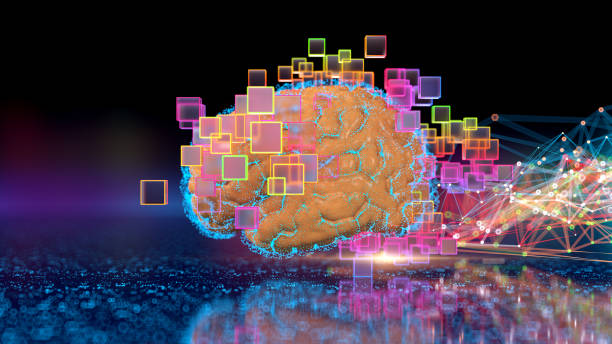What is Artificial Intelligence and what are its applications?

Artificial Intelligence (#AI) or Machine Intelligence refers to the development of computer systems capable of performing tasks that usually require human intelligence.
These tasks include learning, reasoning, problem-solving, natural language understanding, and pattern recognition.
Artificial Intelligence is rapidly changing the face of our world and has numerous applications in various industries.
Some of these applications include:
- Medical: Diagnosis of diseases, drug development, and provision of personalized healthcare
- Finance: Fraud detection, risk management, and provision of automated financial advisory services
- Transportation: Self-driving cars, route optimization, and traffic management
- Marketing: Customer behavior analysis, personalized advertising, and automated customer service
- Manufacturing: Process automation, quality control, and prediction of machine failures
In fact, Artificial Intelligence has the potential to affect almost every aspect of our lives.
With technological advancements, we expect to see more emerging and widespread applications of Artificial Intelligence.
Further study on Artificial Intelligence on Wikipedia can provide useful information in this regard.
Are you tired of your e-commerce site having visitors but no sales? Rasaw, with professional e-commerce website design, solves your main problem!
✅ Significant increase in sales with targeted design
✅ Flawless user experience for your customers
⚡ Get a free consultation!
Machine Learning and its Role in Artificial Intelligence

Machine Learning is one of the main subfields of Artificial Intelligence that allows systems to learn from data without explicit programming.
In fact, machine learning systems identify patterns and relationships within data by analyzing them, and based on these patterns, they make new predictions or decisions.
This process is similar to how humans learn from experience.
Machine learning algorithms are divided into three main categories:
- Supervised Learning: In this method, the system is trained using labeled data (i.e., data for which the correct answer is known).
- Unsupervised Learning: In this method, the system is trained using unlabeled data and must independently identify hidden patterns and structures in the data.
- Reinforcement Learning: In this method, the system learns how to make the best decisions by trial and error and receiving feedback (reward or penalty) from the environment.
Machine Learning plays a very important role in the development of Artificial Intelligence and allows systems to perform complex tasks automatically and without the need for manual programming.
The use of Machine Learning in Artificial Intelligence is increasing day by day.
Types of Machine Learning Algorithms

Machine learning algorithms are very diverse, and each is suitable for a specific type of problem and data.
Some of the most important and widely used machine learning algorithms include:
- Linear Regression: For predicting continuous values based on a linear relationship between variables
- Logistic Regression: For predicting the probability of an event occurring or classifying data into two categories
- Decision Tree: For classifying or regressing data based on a series of decision rules
- Support Vector Machine: For classifying data by finding the best hyperplane that separates the data
- Neural Networks: For modeling complex relationships between data using a structure similar to the human brain
- Clustering Algorithms: For grouping data into clusters where members of each cluster are similar to each other
Choosing the right algorithm for a specific problem requires knowledge and experience and should be done based on the characteristics of the data and the goal of the problem.
A correct understanding of the types of algorithms and their applications is essential for success in Artificial Intelligence projects.
| Algorithm | Application |
|---|---|
| Linear Regression | House price prediction |
| Logistic Regression | Spam email detection |
| Decision Tree | Disease diagnosis |
Deep Neural Networks and Their Applications

Deep Neural Networks are a type of neural network that have multiple hidden layers.
These deep layers allow networks to identify more complex and abstract relationships in data.
Deep neural networks have achieved significant breakthroughs in various fields of Artificial Intelligence in recent years and have numerous applications, including:
- Computer Vision: Face recognition, object detection, medical image processing
- Natural Language Processing: Machine translation, sentiment analysis, text generation
- Speech Recognition: Speech-to-text conversion, speaker recognition
- Game Playing: Chess, Go
The success of deep neural networks is due to various factors, including access to large amounts of data, advancements in hardware (especially GPUs), and the development of new algorithms.
However, training deep neural networks remains a challenge and requires extensive knowledge and experience.
Artificial Intelligence and deep neural networks have always been of interest to researchers.
Losing potential customers due to an unprofessional website? Rasaw is your answer! With our specialized corporate website design services:
✅ Boost your business’s credibility and standing
✅ Attract more targeted customers
⚡ Act now for a free consultation!
Challenges and Limitations of Artificial Intelligence

Despite significant advancements, Artificial Intelligence still faces numerous challenges and limitations.
Some of the most important of these challenges include:
- Need for large amounts of data: Many Artificial Intelligence algorithms, especially deep neural networks, require vast amounts of data for training.
- Interpretability: Understanding how some Artificial Intelligence algorithms, especially deep neural networks, make decisions is difficult.
This can create problems related to trust and accountability. - Bias: If the training data for Artificial Intelligence algorithms contains bias, this bias will also be reflected in the system’s performance.
- Security: Artificial Intelligence systems can be vulnerable to cyberattacks.
- Ethical issues: The use of Artificial Intelligence can raise serious ethical issues, including matters of privacy, discrimination, and job loss.
Addressing these challenges and limitations is essential for the responsible and beneficial development of Artificial Intelligence.
Researchers and policymakers must collaborate to find solutions to these challenges.
To ensure that Artificial Intelligence is developed ethically, these issues must be addressed.
What will be the Future of Artificial Intelligence?

Predicting the future of Artificial Intelligence is difficult, but many experts believe that Artificial Intelligence will increasingly play a role in our lives.
In the coming years, we expect to see significant advancements in the following areas:
- Artificial General Intelligence (AGI): Development of systems capable of performing any task a human can do.
- Explainable AI (XAI): Development of systems that can explain how they make decisions.
- Ethical AI: Development of systems that operate based on ethical principles.
- Integration of AI with other technologies: Integration of Artificial Intelligence with technologies such as the Internet of Things, Blockchain, and Augmented Reality.
However, the development of Artificial Intelligence will also come with challenges.
To ensure that Artificial Intelligence is used for the benefit of humanity, its ethical, social, and economic implications must be considered.
The Impact of Artificial Intelligence on the Job Market

Artificial Intelligence (AI) not only creates new technologies but also has significant impacts on the job market.
Automation of processes and increased productivity lead to changes in job roles and the creation of new opportunities.
However, there are also concerns about job loss and the need for new skill training.
Positive impacts of Artificial Intelligence on the job market include:
- Creation of new jobs: Artificial Intelligence not only replaces some jobs but also creates new jobs in areas of development, implementation, and maintenance of Artificial Intelligence systems.
- Increased productivity: Automation of repetitive and simple tasks allows employees to focus on more complex and creative tasks.
- Improved working conditions: Artificial Intelligence can help reduce risks and improve safety conditions in workplaces.
With this in mind, there are also challenges:
- Job losses: Automation may lead to job losses in some industries, especially jobs with repetitive and automatable tasks.
- Need for new skills: The job market requires new skills such as data analysis, software development, and working with Artificial Intelligence systems.
- Income inequality: Income inequality may increase between those who have the necessary skills in the new job market and those who do not.
| Industry | Impact of Artificial Intelligence |
|---|---|
| Manufacturing | Increased automation and improved productivity |
| Customer Service | Provision of automated support services and faster response times |
| Healthcare | More accurate disease diagnosis and provision of personalized treatments |
Overall, Artificial Intelligence (AI) requires planning and investment in training and skill development to be effectively integrated into the job market and to prevent its negative impacts.
The Role of Data in Artificial Intelligence Development

Data plays a vital role in the development and performance of Artificial Intelligence (AI).
Machine learning algorithms require large amounts of data to learn and improve their performance.
The quality, volume, and diversity of data directly impact the accuracy and reliability of Artificial Intelligence systems.
The importance of data in Artificial Intelligence (AI) is as follows:
- Algorithm training: Data is used as input for training machine learning algorithms.
The more and diverse the training data, the better the algorithm can recognize patterns and make more accurate predictions. - Performance evaluation: Data is also used to evaluate the performance of Artificial Intelligence systems.
Using test data, the accuracy and reliability of the system can be measured. - Continuous improvement: By collecting and analyzing new data, Artificial Intelligence systems can be continuously improved and their performance optimized.
Challenges related to data in Artificial Intelligence (AI):
- Data access: Access to sufficient and appropriate data can be difficult, especially in some areas where data is sensitive and confidential.
- Data quality: Data may contain errors, flaws, or biases that can negatively impact the performance of Artificial Intelligence systems.
- Data privacy: The collection and use of data must comply with privacy principles and relevant regulations.
Proper data management, including its collection, cleansing, and storage, is essential for the success of Artificial Intelligence (AI) projects.
Also, the use of advanced techniques such as federated learning and data privacy preservation can help solve some of the data-related challenges.
Research shows that 80% of customers trust companies with a professional website more. Does your current site inspire this trust?
With Rasaw’s corporate website design services, solve the problem of customer distrust and a weak online presence forever!
✅ Create a professional image and increase customer trust
✅ Attract more sales leads and grow your business
⚡ Get a free consultation!
Ethics in Artificial Intelligence

With the increasing advancement of Artificial Intelligence (AI), ethical issues related to it are also gaining more importance.
Automated decision-making, biases in data, privacy, and accountability are among the topics that require careful consideration and attention.
The most important ethical issues in Artificial Intelligence (AI) are:
- Bias and discrimination: Artificial Intelligence algorithms may learn biases based on their training data and discriminate in their decision-making.
This can lead to inequality and injustice. - Privacy: The collection and use of personal data to train Artificial Intelligence algorithms can violate individuals’ privacy.
- Accountability: If an Artificial Intelligence system makes a mistake, determining responsibility is difficult.
Should the developer, user, or the system itself be held responsible? - Transparency: The decision-making process of Artificial Intelligence algorithms is often ambiguous and incomprehensible.
This can reduce public trust in these systems.
To solve these ethical issues, efforts must be made to develop unbiased algorithms, preserve data privacy, establish accountability, and increase the transparency of Artificial Intelligence systems.
Developing appropriate laws and regulations can also help guide the development and use of Artificial Intelligence for the public good.
Artificial Intelligence in Iran

Artificial Intelligence in Iran has also been recognized as an important and high-potential field.
Universities, research centers, and knowledge-based companies are active in various areas of Artificial Intelligence and are striving to use this technology for the country’s development.
Status of Artificial Intelligence in Iran:
- Research and Development: Universities and research centers are conducting advanced research in various fields of Artificial Intelligence, including machine learning, natural language processing, and computer vision.
- Startups: A number of startups in Iran are developing Artificial Intelligence solutions for various industries, including healthcare, agriculture, and transportation.
- Government support: The Iranian government also supports the development of Artificial Intelligence and implements programs to encourage research and development in this field.
Challenges of Artificial Intelligence development in Iran:
- Lack of specialists: The shortage of skilled specialists in the field of Artificial Intelligence is one of the main challenges for the development of this field in Iran.
- Data access: Access to sufficient and appropriate data for training Artificial Intelligence algorithms can also be difficult.
- Investment: Sufficient investment in research and development of Artificial Intelligence is necessary to compete with developed countries.
Despite these challenges, there is great potential for the development of Artificial Intelligence in Iran.
By investing in education, research, and startup development, Iran can play an important role in this field.
Understanding the importance of Artificial Intelligence in Iran is very important for development.
Frequently Asked Questions
| Question | Answer |
|---|---|
| What is Artificial Intelligence? | It is the simulation of human intelligence in machines programmed to think like humans and imitate their actions. |
| What are the main branches of Artificial Intelligence? | They include machine learning, deep learning, natural language processing, computer vision, and robotics. |
| What is Machine Learning? | It is a branch of AI that focuses on enabling systems to learn from data and identify patterns without explicit programming. |
| Give examples of AI applications in our daily lives. | Voice assistants (like Siri and Alexa), recommendation systems in Netflix and Amazon, self-driving cars, and facial recognition programs. |
| What is Deep Learning? | It is a subset of machine learning that uses multi-layered (deep) artificial neural networks to process large amounts of data. |
| What is Natural Language Processing (NLP)? | It is a branch of AI that focuses on enabling computers to understand, interpret, and generate human language. |
| What are some ethical concerns related to Artificial Intelligence? | They include data bias, privacy, job loss, and accountability in case of errors. |
| What are the main benefits of Artificial Intelligence? | Increased efficiency, improved decision-making, automation of repetitive tasks, and discovery of complex patterns in data. |
| How is Artificial Intelligence used in healthcare? | In diagnosing diseases, drug discovery, medical image analysis, and personalized patient care. |
| How do you see the future of Artificial Intelligence? | It is expected to continue evolving rapidly, affecting all aspects of human life, from industry to education and entertainment. |
And other advertising agency services from Rasaw in the field of advertising
- Intelligent Website Development: A creative platform for improving sales increase with intelligent data analysis.
- Intelligent Website Development: A fast and efficient solution for increasing website traffic with a focus on attractive user interface design.
- Intelligent Customer Journey Mapping: A fast and efficient solution for increasing website traffic with a focus on SEO-driven content strategy.
- Intelligent Data Analysis: A professional solution for customer acquisition with a focus on attractive user interface design.
- Intelligent Website Development: A combination of creativity and technology for user interaction through an SEO-driven content strategy.
And hundreds of other services in the field of online advertising, advertising consulting, and organizational solutions
Online Advertising | Advertising Strategy | Advertorial
Resources
What is Artificial Intelligence and how does it work?What is Artificial Intelligence? Introduction to applications, types, and history of AIArtificial Intelligence Training – From Basic to AdvancedThe future of Artificial Intelligence and its impact on human life
? For elevating your business in the digital world, Rasaw Afarin Digital Marketing Agency, with expertise in SEO, online advertising, and custom website design, is your trusted partner.
📍 Tehran, Mirdamad Street, next to Bank Markazi, Southern Kazeroon Alley, Ramin Alley, No. 6




